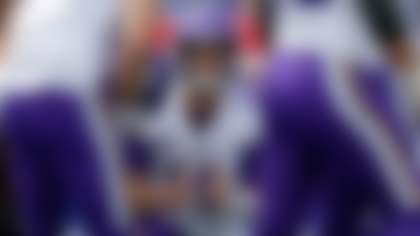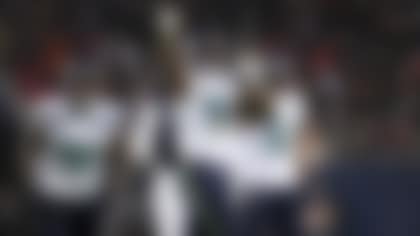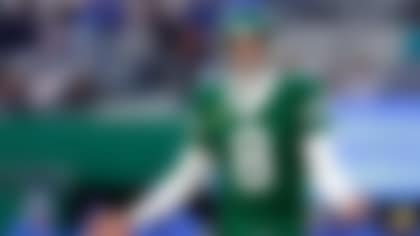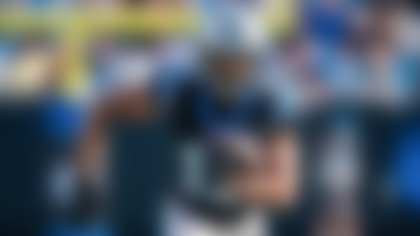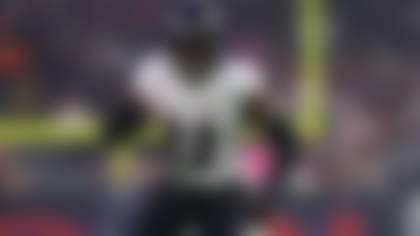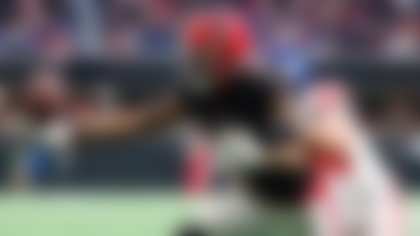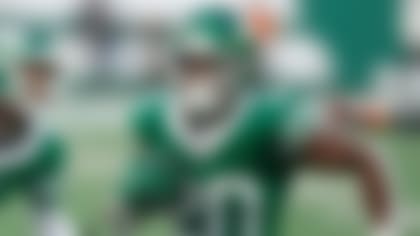The NFC is struggling with a perception problem.
While the AFC has the edge on superstar quarterbacks, Super Bowl-winning head coaches and current dynasties (the Chiefs are chasing their third straight championship), the NFC continually is facing ample scrutiny after last year. People want to know why 49ers head coach Kyle Shanahan can't win a championship, how far the Cowboys can go with Dak Prescott as their quarterback and, of course, what was really behind the epic meltdown that plagued the Eagles at the end of 2023. And that's just for starters.
There are four new head coaches in the conference who need to prove themselves -- Atlanta's Raheem Morris, Carolina's Dave Canales, Seattle's Mike Macdonald and Washington's Dan Quinn -- and a handful of others who could be dealing with seriously hot seats if their respective teams disappoint, including Chicago's Matt Eberflus, Dallas' Mike McCarthy and Philadelphia's Nick Sirianni. Carolina quarterback Bryce Young, the first overall pick in last year's draft, must improve upon an underwhelming rookie season, while the Bears must find a star with the first overall pick in this year's draft. The Rams will learn what life is like with Aaron Donald moving into retirement. The Lions will see if head coach Dan Campbell can finally take this franchise to its first Super Bowl.
This does not mean the NFC won't be good in 2024. It's merely an acknowledgment that it's much harder to evaluate teams on this side of the ߣĎČÉúAV than the other. By the way, that won't stop us from trying. Here's how all the teams in this conference measure up when determining the hierarchy in the NFC.
Super Bowl contenders
San Francisco 49ers, Detroit Lions, Green Bay Packers, Dallas Cowboys, Philadelphia Eagles
These teams all make this list for the same reasons: They have tons of talent and quarterbacks who possess MVP potential and/or big-game experience. Also, all five head coaches have at least guided a group to Championship Sunday. Yes, you can find faults and raise questions with more than a few of these top contenders. What you can't do is think people will be shocked if any of these franchises win the NFC championship this coming season.
The 49ers represented the conference in Super Bowl LVIII and fell to the Chiefs in an overtime classic. San Francisco's plenty good enough to return to that game and win it, largely because the core of this team remains intact. Quarterback Brock Purdy went from being an inspirational story as a rookie to becoming an MVP candidate in his second season. His supporting cast is one of the best in the business, a group that includes running back Christian McCaffery, tight end George Kittle and wide receiver Deebo Samuel. The defense also remains disruptive because of stars like edge rusher Nick Bosa and linebacker Fred Warner.
There are some questions the Niners will have to answer before training camp starts -- such as how they'll deal with wide receiver Brandon Aiyuk's contract situation and the availability of linebacker Dre Greenlaw after he tore an Achilles in the Super Bowl -- but this team will be a monster again. The squad San Francisco rallied to beat in the NFC Championship Game, Detroit, will be equally scary. Lions general manager Brad Holmes came into this offseason looking to upgrade on defense. What he's found so far are some nice additions, including defensive tackle D.J. Reader, edge rusher Marcus Davenport and cornerback Carlton Davis III. Though the unit did take a hit with the abrupt release of CB Cameron Sutton.
The Lions' biggest news on offense involved the return of coordinator Ben Johnson, who has led one of the most dangerous units in football over the past two years. His decision to spurn head-coaching opportunities gives quarterback Jared Goff and his fellow teammates even more reason to produce major numbers this coming fall. It's also apparent that Detroit will need to be even more aware of the competition within its own division because Green Bay is growing up in a hurry. The Packers blew out Dallas on Super Wild Card Weekend before giving the 49ers all that they could handle in a 24-21 Divisional Round loss.
The first thing to like about Green Bay as a Super Bowl contender is the chemistry between Jordan Love and head coach Matt LaFleur. The coach has an exceptional feel for how to maximize Love's strengths, and the 25-year-old quarterback raised his game in the second half of last season. Now think about the potential of that offense with newly acquired free-agent running back Josh Jacobs in the backfield. The Packers still need to improve on defense -- a job that falls to new coordinator Jeff Hafley -- but their postseason effort last season proved this is a team on the rise.
The Cowboys and Eagles finish out this list and both face plenty of questions heading into the fall. For Dallas, it's a matter of whether this team can finally stop disappointing in the playoffs with its current core. Prescott takes a lot of blame, but that playoff loss to Green Bay was about an entire team falling apart. This roster has too much talent -- including All-Pro-caliber players like wide receiver CeeDee Lamb, guard Zack Martin and linebacker Micah Parsons -- to not push deeper into the postseason. The return of star cornerback Trevon Diggs from a torn ACL makes this group that much better.
Philadelphia faces a tougher task: putting all the questions about locker room chemistry behind it. This is a team that went from nearly beating Kansas City in Super Bowl LVII to imploding in the second half of last season, losing five of its last six regular-season games before mailing in a wild-card loss to Tampa Bay. The good news is that general manager Howie Roseman has been making aggressive moves, per usual. That should help give this team a chance to put last year behind it.
The signing of free-agent running back Saquon Barkley provides another dynamic weapon to an offense that already boasts quarterback Jalen Hurts, tight end Dallas Goedert and wide receivers DeVonta Smith and A.J. Brown. The defense missed safety C.J. Gardner-Johnson after he left in free agency a year ago, but he returned this offseason. The acquisitions of edge rusher Bryce Huff and linebacker Devin White should also improve a unit that turned into a weekly liability by season's end.
Playoff potential
Atlanta Falcons, Tampa Bay Buccaneers, Los Angeles Rams
These are teams that have the goods to win a division but lack a few key qualities that would make them elite. Two of them -- the Bucs and Rams -- are the only NFC teams to win a Super Bowl this decade. The third, Atlanta, has been steadily building the talent on the roster in the hopes that someday a quarterback would come along to turn it back into a playoff team. That day finally arrived last month, when free-agent quarterback Kirk Cousins decided to leave Minnesota in search of a new challenge.
It obviously helped that Atlanta gave Cousins $100 million in guaranteed money to make that decision. However, you can't fault Cousins for being excited about what the Falcons' roster can offer. Atlanta has loaded up on skill players in previous drafts, so the young talent is there, especially with the likes of tight end Kyle Pitts, wide receiver Drake London and running back Bijan Robinson (all of whom were top-10 picks in their respective draft classes). This is a team that should generate a lot of points and challenge for the NFC South title.
The Buccaneers won't make those dreams easy to realize, especially since they've won that division three years in a row. General manager Jason Licht also has enjoyed a strong offseason. He re-signed star wide receiver Mike Evans to a new deal, worked out a reasonable contract to keep quarterback Baker Mayfield and used the franchise tag to create time to work out a long-term extension with All-Pro safety Antoine Winfield Jr. The Buccaneers might not be what they were when Tom Brady was running the show, but they're still scrappy enough to be playing meaningful games in December and January.
As for the Rams, their turnaround last season was one of the bigger surprises. Weren't they supposed to be doomed to years of frustration after going all in -- and paying some big salaries -- in order to produce a Super Bowl win in the 2021 season? So much for that thinking. Rams general manager Les Snead proved he can still pick players and head coach Sean McVay knows how to get the most out of them. That explains how this team is suddenly flush with young talents like wide receiver Puka Nacua, running back Kyren Williams, defensive tackle Kobie Turner and edge rusher Byron Young.
Of course, the Rams' defense took a major hit when Donald retired last month, so that puts even more burden on those less-accomplished players to produce. One thing Snead is likely hoping is that three noteworthy free-agent signings in the secondary -- cornerbacks Tre’Davious White and Darious Williams and safety Kamren Curl -- can ease the fact that Donald won't be terrorizing opposing passers anymore. The Rams still aren't as good as they were when they won that last Super Bowl. They also are much closer to being a championship contender than many expected by this point.
Intriguing possibilities
Chicago Bears, Seattle Seahawks
Both teams in this category can make significant jumps from where they finished in 2023 if certain things break their way. The Bears obviously are in the best position because of their draft status. They hold the first overall pick (and No. 9) and it's likely to be USC quarterback Caleb Williams now that the franchise has traded Justin Fields to Pittsburgh. The nice thing for a rookie signal-caller landing in this situation is that Chicago general manager Ryan Poles has put a lot of variables in place to ensure success. Along with having a defense that improved dramatically in the second half of last season, Poles signed running back D’Andre Swift in free agency and traded for wide receiver Keenan Allen.
The Bears won't be a team asking a first-year quarterback to work miracles, which happened to be the situation that Fields had to deal with for most of his three seasons in Chicago. Instead, the team's next starting quarterback will be asked to distribute the football and grow at a reasonable pace. It's not too far off from the scenario quarterback C.J. Stroud found himself in when he landed in Houston as the second overall pick in last year's draft. And of course, last season saw Stroud blossom into a star and the Texans enjoy their first winning campaign -- and playoff appearance -- in four years.
The Seahawks haven't experienced as long a drought, as they were in the playoffs in 2022. They're on this list because they're moving into a new era, with Mike Macdonald succeeding Pete Carroll as head coach. Carroll spent 14 seasons with the Seahawks and led them to a Super Bowl win in the 2013 campaign. Macdonald has been a rising star in the business, as he served as the coordinator of the best defense in football with the Ravens last season.
There isn't likely to be a substantial change in the Seattle offense this fall. All the familiar faces are still there, including quarterback Geno Smith, running back Kenneth Walker III and the wide receiver trio of DK Metcalf, Tyler Lockett and Jaxon Smith-Njigba. The defense is another story. There are some key new players -- most notably safeties Rayshawn Jenkins and linebackers Tyrel Dodson and Jerome Baker -- and a new scheme with Macdonald in charge.
There's little doubt Macdonald earned his current position because of Seattle's defensive problems at the end of Carroll's run. The Seahawks ranked 25th in points allowed in each of the last two seasons, numbers that were unacceptable given the standard Carroll had established on that side of the ball for most of his career. Seattle is betting that Macdonald can work the same magic he did in Baltimore, when he revitalized a Ravens defense that had been plagued by injuries and inconsistency. If he can do that, the Seahawks might be back in the playoffs once again.
Tough road ahead
Minnesota Vikings, New Orleans Saints, New York Giants
A spot in this category means there are some serious questions standing in the way of a team's success. These are the franchises that are good enough to make a push for a playoff spot but also flawed enough to make it hard to count on them. They basically need a lot of things to go right, and the reality is that none of these teams will probably be fortunate enough to have that occur.
The Vikings are going into this season with Sam Darnold likely operating as a bridge quarterback to whomever Minnesota selects in this year's draft. That doesn't mean the Vikes will be awful, as this is still an offense that added running back Aaron Jones to a unit that already had tight end T.J. Hockenson and wide receivers Justin Jefferson and Jordan Addison. It's just that it would've been easier to believe in their chances had Cousins decided to re-sign. Depending on how Chicago's quarterback situation pans out, this could easily be the most talented team in the league that ends up last in its own division.
The Saints' problem is that this team has plateaued. A good defense is hoping for stellar play from aging stars like defensive end Cam Jordan (who turns 35 in July), linebacker Demario Davis (who's already 35) and safety Tyrann Mathieu (who turns 32 in May). The offense has playmakers in running back Alvin Kamara and wide receiver Chris Olave, but quarterback Derek Carr is now the third-best signal-caller in the division. This team won nine games in 2023. It will have a hard time doing that again.
Finally, we have the Giants. They've made a concerted effort to improve their most glaring weakness from last season -- they beefed up the offensive line with the acquisitions of new guards Aaron Stinnie and Jon Runyan -- and the trade for edge rusher Brian Burns should make the pass rush more disruptive with Kayvon Thibodeaux (11.5 sacks last year) operating on the other side. But let's be honest: This team's hopes rest on whatever quarterback Daniel Jones does in his sixth season. He's already going to be without the team's best weapon from the past few years (Saquon Barkley), and there are plenty of rumblings about the Giants taking a quarterback in the first round.
Brian Daboll won ߣĎČÉúAV Coach of the Year honors two years ago by taking a flawed team to the playoffs. He would likely win it a second time if he could repeat that feat with this roster.
Next year can't come fast enough
Carolina Panthers, Washington Commanders, Arizona Cardinals
These teams all have one thing in common: They have a good chance of being the worst teams in their respective divisions. The overall talent isn't there, and only the Cardinals have a quarterback they can trust. The bottom line is that somebody has to finish last. These are merely the teams that make the most sense at the moment.
The Panthers were an easy choice for this category. They were the worst team in football last season, and they won't even get a reward for that misery, as they traded the first overall pick to the Bears last year. The player they acquired in that trade was Young. The jury is still out as to what type of signal-caller he will be after a rookie year that was as chaotic as any in recent memory (which included the firing of head coach Frank Reich after the team stumbled out to a 1-10 start).
Carolina was aggressive in free agency for the second straight offseason, but its most critical moves came along the offensive line. The Panthers invested big money in guards Robert Hunt and Damien Lewis in hopes of better protecting Young, who was sacked the second-most times of any quarterback in the league last season (62). The trade that brought wide receiver Diontae Johnson over from Pittsburgh should help the offense, as well, but the Panthers desperately needed to add explosiveness to their passing attack.
Arizona is also in the market for offensive playmakers, as quarterback Kyler Murray doesn't have much to work with in his own receiving room. The smart money has the Cardinals drafting a wide receiver with the fourth overall pick (if they don't trade down), which is why they've spent the offseason addressing other glaring needs. Along with signing offensive tackle Jonah Williams in free agency, the Cardinals added plenty of defensive help (linebacker Mack Wilson, cornerback Sean Murphy-Bunting and defensive tackles Bilal Nichols and Justin Jones). The question is how fast all these players can impact a roster that isn't nearly as talented as the rest of the NFC West.
The Commanders need to find a franchise quarterback and they'll have plenty of options with the second overall pick. In the meantime, they've made a flurry of offseason moves to bolster their own roster. The high-profile free-agent signings on offense include running back Austin Ekeler, center Tyler Biadasz and tight end Zach Ertz. The defense added even more noteworthy players, with defensive end Dorance Armstrong, safety Jeremy Chinn and linebackers Bobby Wagner and Frankie Luvu coming onboard. It's pretty obvious that new head coach Dan Quinn will be leaning on that revamped defense in his first year on the job, especially with all the offense Philadelphia and Dallas can generate.

